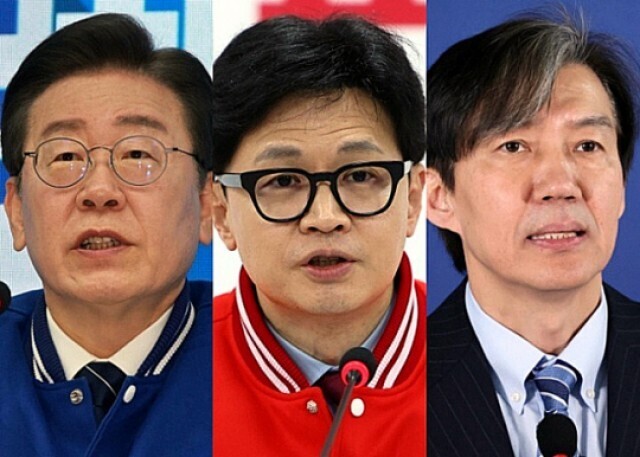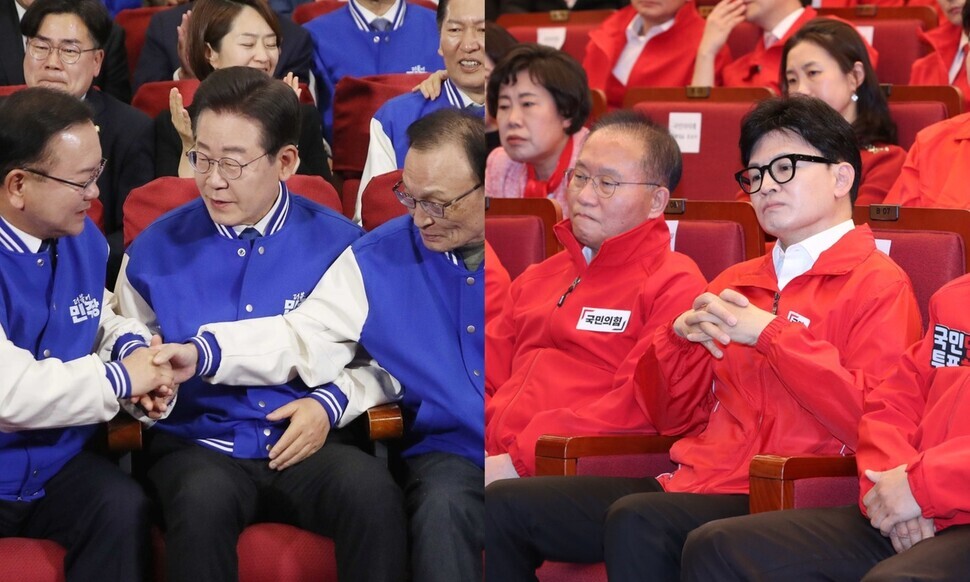hankyoreh
Links to other country sites 다른 나라 사이트 링크
Koreans resoundingly rebuke president in midterm legislative elections

The Korean public delivered a punishing rebuke to President Yoon Suk-yeol in the parliamentary elections on Wednesday. The Democratic Party and other opposition parties prevailed, crushing Yoon’s conservative People Power Party (PPP). With the opposition retaining a firm grip on the National Assembly, Yoon is likely to lose a lot of steam for governance in the second half of his presidency.
Final vote tallies for the 22nd National Assembly election had the Democratic Party winning 161 electoral districts, and the PPP taking 90 districts. The Reform Party, New Future Party (Saemirae) and Progressive Party each claimed one district apiece.
With 46 seats up for grabs under Korea’s system of proportional representation, the allotments were 18 seats for the People Future Party (a satellite party of the PPP), 14 seats for the Democratic United Party (a satellite party of the Democratic Party), 12 seats for the Rebuilding Korea Party and two seats for the Reform Party.
That gives the Democratic Party and its satellite party a combined total of 175 seats, and the PPP and its satellite party 108 seats. The minor Green Justice Party won no seats at all.
Lawmakers at the national level serve four-year terms in Korea, meaning the 22nd National Assembly will be in place until Yoon leaves office.
Joint exit polls by Korea’s three major terrestrial broadcasters (KBS, MBC and SBS) that were announced at 6 pm on Wednesday had projected the combined opposition would claim 200 of the total 300 seats in the National Assembly (254 lawmakers elected in districts and 46 through proportional representation). But once ballots were actually tallied, PPP candidates ended up winning more districts than expected.
The ballot count in electoral districts (as of 3 am) indicated that the Democratic Party had picked up 99 of 122 districts in the greater Seoul area. The main opposition party was also leading in 21 out of 28 districts in North and South Chungcheong, which often play kingmaker in Korean elections.
But the PPP performed rather well in the Nakdong River belt — the southeastern corner of the country, near Busan, Ulsan and South Gyeongsang Province — where it won 34 of 40 battleground districts.

This is the Democratic Party’s third consecutive victory in Korea’s general elections, giving it both immense influence over the legislative process, as well as weighty responsibility for running the country.
Shortly after exit polls were announced, Democratic Party leader Lee Jae-myung said he intended to “humbly uphold the people’s choice to the last.”
The Rebuilding Korea Party, which led the way in framing the election as a “message of clear judgment against the administration,” appears likely to play a key part in the opposition after coming away with more than 10 seats. Outside of those parties, observers are also watching to see what sort of role Reform Party candidate Lee Jun-seok will play after emerging victorious in his run for the Hwaseong B seat in Gyeonggi Province.
After the decisive blow dealt by voters, the Yoon administration and ruling PPP are expected to face severe fallout. The administration will end up as the first in the history of Korea’s constitutional government to spend all five years of its term facing an opposition-dominated parliament.
With the pan-opposition field reaching a cumulative total of more than 180 seats, it will not only be able to unilaterally pass legislation like the 21st National Assembly but also to use fast-tracking and other means of thwarting the PPP’s attempts to block bills. Had it managed to grab 200 seats, it would effectively have nullified the president’s veto powers and empowered the parliament to amend the Constitution and pursue impeachment.
But with some candidates defying the exit poll findings to achieve victory when votes were actually counted, some were still hanging on to hopes.
Commenting on the exit poll results, PPP emergency committee chairperson Han Dong-hoon said, “Despite our best efforts to pursue politics in line with the public’s will, the exit poll results have been disappointing.”
“We’re going to wait until all the votes are in,” he added.
The election’s provisional voter turnout rate of 67.0% was the highest in 32 years since the 14th general elections in 1992, when the rate reached 71.9%.
By Lim Jae-woo, staff reporter
Please direct questions or comments to [english@hani.co.kr]
Editorial・opinion
![[Guest essay] Maybe Korea’s rapid population decline is an opportunity, not a crisis [Guest essay] Maybe Korea’s rapid population decline is an opportunity, not a crisis](https://flexible.img.hani.co.kr/flexible/normal/500/300/imgdb/original/2024/0430/9417144634983596.jpg) [Guest essay] Maybe Korea’s rapid population decline is an opportunity, not a crisis
[Guest essay] Maybe Korea’s rapid population decline is an opportunity, not a crisis![[Column] Can Yoon steer diplomacy with Russia, China back on track? [Column] Can Yoon steer diplomacy with Russia, China back on track?](https://flexible.img.hani.co.kr/flexible/normal/500/300/imgdb/original/2024/0430/1617144616798244.jpg) [Column] Can Yoon steer diplomacy with Russia, China back on track?
[Column] Can Yoon steer diplomacy with Russia, China back on track?- [Column] Season 2 of special prosecutor probe may be coming to Korea soon
- [Column] Park Geun-hye déjà vu in Yoon Suk-yeol
- [Editorial] New weight of N. Korea’s nuclear threats makes dialogue all the more urgent
- [Guest essay] The real reason Korea’s new right wants to dub Rhee a founding father
- [Column] ‘Choson’: Is it time we start referring to N. Korea in its own terms?
- [Editorial] Japan’s rewriting of history with Korea has gone too far
- [Column] The president’s questionable capacity for dialogue
- [Column] Are chaebol firms just pizza pies for families to divvy up as they please?
Most viewed articles
- 1Under conservative chief, Korea’s TRC brands teenage wartime massacre victims as traitors
- 2Months and months of overdue wages are pushing migrant workers in Korea into debt
- 3[Guest essay] Maybe Korea’s rapid population decline is an opportunity, not a crisis
- 4[Column] Can Yoon steer diplomacy with Russia, China back on track?
- 5First meeting between Yoon, Lee in 2 years ends without compromise or agreement
- 6After election rout, Yoon’s left with 3 choices for dealing with the opposition
- 7[Column] Behind factional animus of Korean politics, victim mentality festers
- 8‘We must say no’: Seoul defense chief on Korean, USFK involvement in hypothetical Taiwan crisis
- 9[Editorial] Japan’s removal of forced labor memorial tramples on remembrance, reflection and friends
- 10[Guest essay] A society in which old age becomes a burden